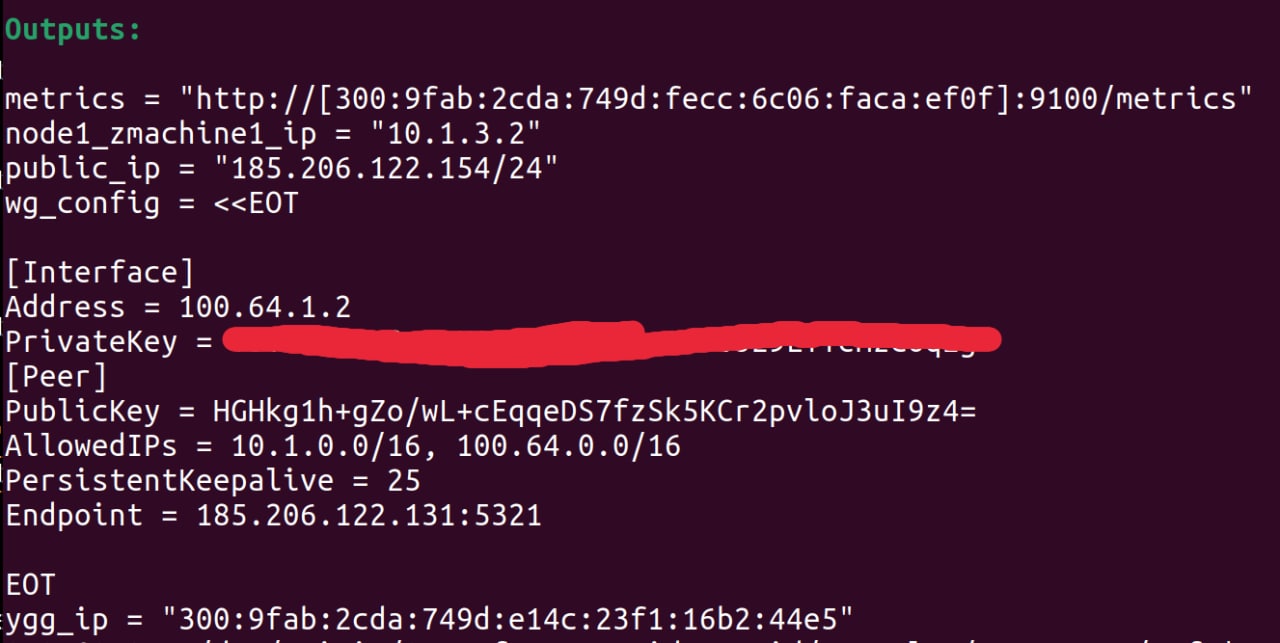Greetings,
I managed to deploy a qsfs on the testnet with terraform from the examples on github: https://github.com/threefoldtech/terraform-provider-grid/blob/development/examples/resources/qsfs/main.tf
Now I want to access it to upload some files and perform a few tests.
How do I access the server? I’m used to just ssh-ing into a vm.
For clarity, here is my output:
And my terraform config:
terraform {
required_providers {
grid = {
source = "threefoldtech/grid"
}
}
}
provider "grid" {
}
locals {
metas = ["meta1", "meta2", "meta3", "meta4"]
datas = ["data1", "data2", "data3", "data4"]
}
resource "grid_network" "net1" {
nodes = [7]
ip_range = "10.1.0.0/16"
name = "network"
description = "newer network"
add_wg_access = true
}
resource "grid_deployment" "d1" {
node = 7
dynamic "zdbs" {
for_each = local.metas
content {
name = zdbs.value
description = "description"
password = "password"
size = 10
mode = "user"
}
}
dynamic "zdbs" {
for_each = local.datas
content {
name = zdbs.value
description = "description"
password = "password"
size = 10
mode = "seq"
}
}
}
resource "grid_deployment" "qsfs" {
node = 7
network_name = grid_network.net1.name
ip_range = lookup(grid_network.net1.nodes_ip_range, 7, "")
qsfs {
name = "qsfs"
description = "description6"
cache = 10240 # 10 GB
minimal_shards = 2
expected_shards = 4
redundant_groups = 0
redundant_nodes = 0
max_zdb_data_dir_size = 512 # 512 MB
encryption_algorithm = "AES"
encryption_key = "4d778ba3216e4da4231540c92a55f06157cabba802f9b68fb0f78375d2e825af"
compression_algorithm = "snappy"
metadata {
type = "zdb"
prefix = "hamada"
encryption_algorithm = "AES"
encryption_key = "4d778ba3216e4da4231540c92a55f06157cabba802f9b68fb0f78375d2e825af"
dynamic "backends" {
for_each = [for zdb in grid_deployment.d1.zdbs : zdb if zdb.mode != "seq"]
content {
address = format("[%s]:%d", backends.value.ips[1], backends.value.port)
namespace = backends.value.namespace
password = backends.value.password
}
}
}
groups {
dynamic "backends" {
for_each = [for zdb in grid_deployment.d1.zdbs : zdb if zdb.mode == "seq"]
content {
address = format("[%s]:%d", backends.value.ips[1], backends.value.port)
namespace = backends.value.namespace
password = backends.value.password
}
}
}
}
vms {
name = "vm"
flist = "https://hub.grid.tf/tf-official-apps/base:latest.flist"
cpu = 2
memory = 1024
entrypoint = "/sbin/zinit init"
publicip = true
planetary = true
env_vars = {
SSH_KEY = "ssh-ed25519 AAAAC3NzaC1lZDI1NTE5AAAAIIwVBFL95gmLMcck2XVlZIKNDDOEWq09q8xFtsiMb7JU toto@adastraindustries.com"
}
mounts {
disk_name = "qsfs"
mount_point = "/qsfs"
}
}
}
output "metrics" {
value = grid_deployment.qsfs.qsfs[0].metrics_endpoint
}
output "ygg_ip" {
value = grid_deployment.qsfs.vms[0].ygg_ip
}
output "public_ip" {
value = grid_deployment.qsfs.vms[0].computedip
}
output "node1_zmachine1_ip" {
value = grid_deployment.qsfs.vms[0].ip
}
output "wg_config" {
value = grid_network.net1.access_wg_config
}



